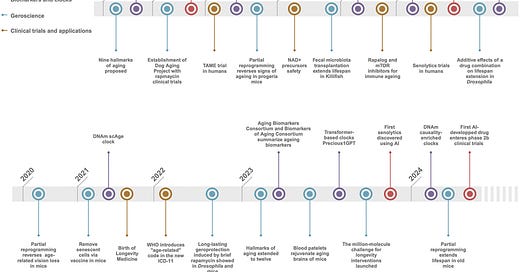Key Trends in Aging Research: Where Are We Now?
And my thoughts on what is available to an "average person," like myself, in terms of being able to live healthier and longer.
Hi! This is BiopharmaTrend’s weekly newsletter, ‘Where Tech Meets Bio,’ where we talk about technologies, breakthroughs, and great companies moving the biopharma and medtech industries forward.
If you've received it, then you either subscribed or someone forwarded it to you. If the latter is the case, subscribe by pressing this button:
Now, let’s get to this week’s topic!
Over the past decade, aging research has transitioned from foundational biological studies, including a landmark introduction of 9 hallmarks of aging back in 2013 and its expanded version of 12 hallmarks in 2023, to a highly technical, multidisciplinary field. This transformation has been driven by a lot of advances in biology, but also technological innovations, particularly in artificial intelligence (AI), which enabled more sophisticated biomarker discovery, and clinical interventions.
Below, I would like to highlight some major trends shaping this field, based on the latest insights from a comprehensive article “Longevity biotechnology: bridging AI, biomarkers, geroscience and clinical applications for healthy longevity” which was published as a collective work initiated during 2023 Aging Research and Drug Discovery (ARDD) meeting. I would also share some thoughts about what can probably be done today for “an average person”.
I was introduced to the field of aging research quite recently, when I first visited a high profile conference, 11th Aging Research and Drug Discovery Meeting (ARDD2024) in the city of Copenhagen at the end of August. It was a very pleasant experience, both organization-wise and content-wise, but this post is not about that.
I found that the aging research industry has a lot of potential with a diverse set of interventions in preclinical stages, successes in animal models, and even some ongoing clinical trials which are kind of related to aging. However, I was left with an impression that as of now, there seems to be not a lot that is available to the general public beyond traditional “sleep well, eat well, exercise, run yearly checkups, and socialize” kinds of things (aka “what mother told you”). There are some exceptions, with a number of potentially beneficial remedies available for a few of those who possess sufficient domain knowledge to really understand and manage the risk-to-benefit ratio. Results are also not proven definitively, but are quite likely.
So, we are in very early days of real longevity for everyone, but it is also true that we may expect some major advances fairly soon and quite unexpectedly (or not, who really knows).
Anyway, let’s get to insights from the article and my thoughts along the lines of “great, so what?“:




